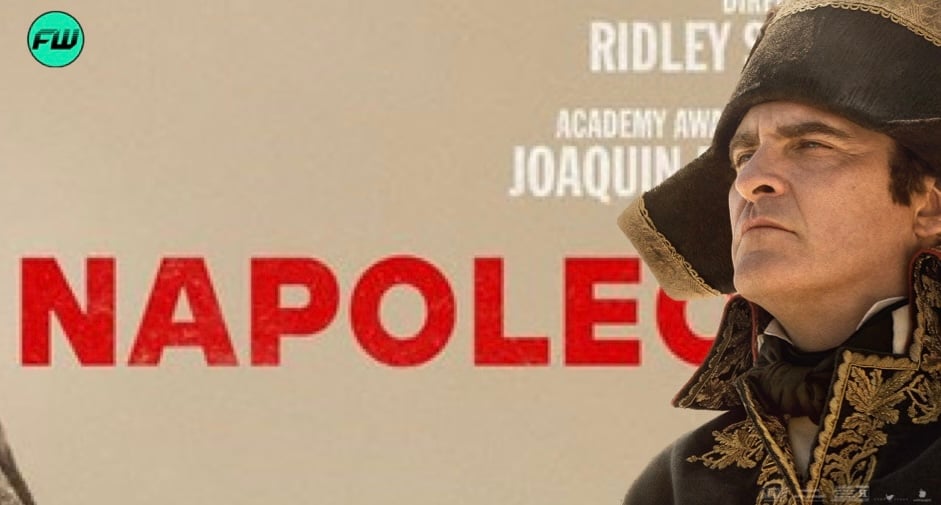I love war epics. I love films featuring historical people or events. And I also love most of Ridley Scott’s filmography, as some of his movies are indisputable all-timers of cinema (Alien, Blade Runner, Gladiator). Since Napoleon is obviously based on the French emperor, the moderate personal expectations were mostly due to a few unavoidable mixed reactions, but nonetheless, I was ready for all scenarios, hoping to leave the theater with a more positive take than others. Sadly, I left extremely triggered by a film that doesn’t know what it wants to be.
Napoleon Critique

Also Read: Ridley Scott on French Critics Hating Napoleon
Scott’s ambitious exploration of the tumultuous life of Napoleon Bonaparte unfolds as if it’s a grandiose venture, packed with epic-scaled battle set pieces and a narrative that tries to delve into the complexities of the notorious French conqueror. However, the director’s true intentions remain unclear as the viewers end the movie without knowing exactly if they’re supposed to appreciate or condemn the acts of the real person. Napoleon portrays its protagonist as a man driven by an insatiable thirst for conquest, victory, and war, whose unbridled ego led him to believe he wasn’t just a leader among men but a figure above all others.
Joaquin Phoenix’s (Joker) portrayal of the French general is efficient, capturing the nuances of a man whose self-assuredness borders on megalomania. Phoenix embodies the relentless determination that characterized Napoleon’s pursuit of conquest, portraying the leader as a force to be reckoned with, driven by an unwavering belief in his own destiny. Still, performances-wise, Vanessa Kirby (The Son) stands out more as Joséphine de Beauharnais, delivering a harrowing display of a woman treated like an object throughout her life, despite countless love letters from her emotionally desperate husband.
As the film progresses, the audience is immersed in the grandeur of epic battle sequences that showcase the scale and intensity of the conflicts Napoleon faced. Dariusz Wolski’s (The Last Duel) cinematography excels in recreating the chaos and spectacle of warfare, providing a visceral experience that transports viewers to the heart of historical battlegrounds. Even in seemingly mundane dialogue scenes, the framing remains pristine, contributing to the overall aesthetic excellence of Napoleon. Martin Phipps’ (The Aftermath) thunderous score also contributes to the cinematic experience that warrants a big screen.
Unfortunately, amidst the numerous wars, Napoleon grapples with a notable issue – its tone. Scott seems torn between different approaches, resulting in a narrative that oscillates between moments of high drama and unexpected, baffling comedy. Abrupt transitions and tonal shifts leave the audience unsettled, struggling to reconcile the gravity of the historical events with the spontaneous moments of levity. The tone inconsistency leaves Napoleon an incomprehensible mess with an ending that serves as evidence of this.

As the customary white text on a black screen reveals the grim reality of the millions of lives lost in Napoleon’s conquests, one realizes the movie failed to evoke the somber reflection a story like this should induce. Instead, the dispassionate overall approach to Napoleon‘s horrendous events seems to underscore a choice to treat the subject matter with such detachment that might leave viewers questioning whether the film intended to merely entertain or provoke deeper contemplation.
Martin Scorsese’s conclusion in Killers of the Flower Moon makes more sense and carries more impact each day that goes by. This transformation of significant stories into hollow spectacles implies a departure from the responsibility of cinema to engage with the moral, ethical, and emotional dimensions of historical narratives. The immediacy of entertainment takes precedence over a deeper understanding of history, so it’s not surprising that Napoleon is also filled with historical inaccuracies.
Scott opts for a fictionalized narrative written by David Scarpa (All the Money in the World), blending elements of history with creative liberties to craft an entertainment-driven flick. There’s nothing fundamentally wrong with any of this – not every historical narrative needs to be a documentary – but some imaginative decisions are borderline ridiculous. Furthermore, even though I understand this is an American flick with non-French actors portraying French characters – which is not an issue, at all – Scott should have been more careful with the accents. Having a British actor portray a French character talking about attacking the English without making any effort to change the actor’s true accent can be extremely confusing.
While the pacing is commendable, managing to condense a vast historical narrative into a 157-minute runtime, the decision to rush through significant character moments and crucial battles raises questions about the necessity of a rumored four-hour cut. Scott may have sacrificed important storytelling elements in the interest of brevity and entertainment, which once again, fits into Scorsese’s poignant commentary about the state of the respective industry.
In Conclusion
Napoleon contributes to a troubling trend in cinema, transforming significant historical narratives into hollow spectacles driven by mere visual entertainment. Despite compelling performances and visually stunning battle set pieces, Ridley Scott fails to control the shockingly inconsistent tone, leading to abrupt shifts between heavy drama and spontaneous comedy. The dispassionate treatment of the millions who suffered through Napoleon’s acts testifies to the dissonant messages of the movie, which ends with an unclear feeling about the status of its protagonist. Too much creative liberty leads to absurd historical inaccuracies, including a questionable lack of French accents and actors. Despite efficient pacing, the 157-minute runtime surprisingly feels rushed, but I don’t believe the rumored four-hour cut will fix so many massive problems…
4/10
Follow us for more entertainment coverage on Facebook, Twitter, Instagram, and YouTube.


